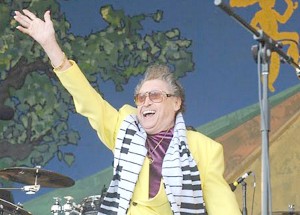The Music Scene: Popular drummer takes to stage; beloved musician’s drum beat goes silent
5th October 2015 · 0 Comments
By Geraldine Wyckoff
Contributing Writer
It’s difficult to say who had more fun at a Frankie Ford show, the audience or the star himself. A smiling Ford, the ultimate entertainer, would bound on a stage assured that his fans loved him as much as he loved them. And he was right. Ford’s enthusiasm filled his voice when in 1959 he belted out one of this city’s party time classics, “Sea Cruise,” with its memorable refrain, “Whoo-ee, whoo-ee baby.” Frankie Ford, dubbed the “New Orleans Dynamo,” died on Monday, September 28, 2015, at the age of 76.
Some, quite understandably, might have considered Ford a “one-hit wonder” because of his huge success with “Sea Cruise” that rose to #14 on the pop charts and #11 on the R&B charts. However, others, particularly those fortunate enough to have seen him perform live, would argue that he was much more than that. The man, a wonderful “drama king” in today’s jargon, could sing and play the piano with a spirit special to New Orleans. That means having a good time while making sure the crowd was doing the same. It was in his blood.
Ford, was born in New Orleans and grew up across the river in Gretna as the adopted son of Vincent and Anna Guzzo, who named their child Frank Guzzo. By age 12 he’d already displayed his talents as a vocalist and pianist, winning several talent contests that were very popular in the day. While attending the Holy Name of Mary High School in Algiers he was a member of a band dubbed the Syncopators.
Ford was spotted by manager Joe Caronna, a representative of Ace Records, who brought him to producer and the label’s founder Johnny Vincent. His first single for the label, 1958’s “Cheatin’ Woman,” complete with a screeching sax solo, became a regional hit and displayed Ford’s potential star power.
Reasons have been given and excuses have been made as to why Vincent decided to have Ford over-dub his voice on the original track of “Sea Cruise,” that had been previously recorded by its composer, the great pianist Huey “Piano” Smith and his group the Clowns featuring Bobby Marchan. It’s been written/speculated that Ace was in the market for a white “teen idol” type to sell more records and they saw that in the young, good looking, affable and talented Ford. A fog horn and bells were added to the tracks and boom, “Sea Cruise” took off like a jet boat. It’s truly regrettable that Smith, a remarkably innovative composer and musician, got left behind in the wake as have too many Black artists who were primarily victims of white musicians topping the charts by covering their tunes. (Think Pat Boone hitting with Little Richard’s “Tutti Frutti.”) One could hardly blame Ford, a talented, ambitious 20-year-old, for not turning down the opportunity to record the 45 rpm for Ace in noted producer Cosimo Matassa’s studio. Interestingly, until this day, many folks that only heard Ford though never saw him or his image, thought he was Black.
The flip side of “Sea Cruise” is another Huey “Piano” Smith gem called “Roberta.” Ford does a solid job on this one too – he kicks it – with the late, great Alvin “Red” Tyler blowing saxophone on both cuts.
One of the reasons that Frankie Ford’s legend never truly faded was that he simply didn’t let it. At every appearance, that included annually at the New Orleans Jazz & Heritage Festival and numerous French Quarter clubs, Ford entered a stage flamboyantly. His bedazzling outfits were often accessorized with a piano keyboard motif while multiple rings shined on his fingers. They were always ready to hit those big chords in the left hand and the signature triplets of the New Orleans rhythm and blues heydays – his era of stardom – in the right hand. His voice, always on key, reached out with pure and heartfelt emotion.
Frankie Ford, who reigned as the 2009 King of the Krewe du Vieux, was loved for the love he gave.
Funeral arrangements were pending at presstime.
Herlin Riley – In the Lineage
Drumming is a language. It speaks with vibrations that can be understood through the body and soul. It is the gift that was brought, unwillingly, unknowingly, by the Black Africans who were brought to the American shores as slaves and remarkably allowed to thrive in New Orleans in Congo Square.
These rhythms have remained, survived and evolved in the perspectives of the great drummers of New Orleans throughout the decades. Their names like the late Paul Barbarin, Earl Palmer, Ed Blackwell, Idris Muhammad, James Black – and those still on the scene including Johnny Vidacovich and Shannon Powell – represent those who have carried on and added to the rhythmic lineage.
On Saturday, October 10, at 8 p.m., another drummer, the great Herlin Riley, who looks to the past and takes it to the future, performs a free concert at the George and Joyce Wein Jazz & Heritage Center, 1225 N. Rampart Street.
The bad news is that all of the free, reserved tickets are gone. However, if seats aren’t claimed by 7:45 p.m., they will be made available. There is also a second set at 9:30 p.m. that could open up some spots. The music will also be piped into the Center’s other rooms.
Riley has assembled a great group of musicians and noticeably those who often don’t have the opportunity to play together. They include pianist David Torkanowsky – always a superb musical instigator – saxophonist Khari Lee, bassist Max Moran and trumpeter Ashlin Parker. Riley says he’s going to do “what I do” but because of this mix of musicians there will definitely be a different flavor.
This article originally published in the October 5, 2015 print edition of The Louisiana Weekly newspaper.




